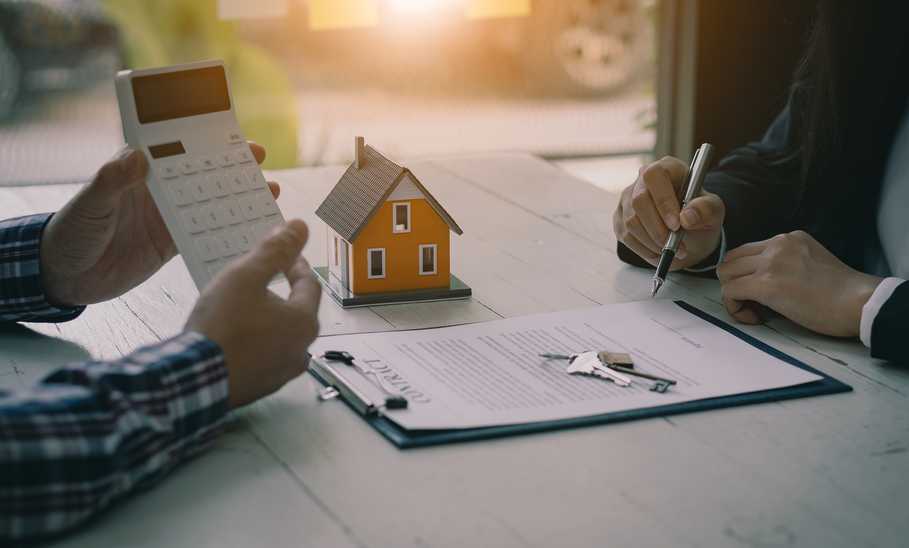The expense of a down payment can make homeownership feel out of reach, especially with housing prices at anall-time high and burdensome rent costs making it difficult (if not impossible) to save. However, borrowers who qualify for a no-down payment mortgage can finance 100% of a home's purchase price and buy a house with no money down at closing. Here's how.
Ways to get a mortgage with no down payment
No-down payment mortgages can be especially helpful to first-time homebuyers and those with limited savings. Government-backed loans are the most common way to avoid a down payment, though some private lenders offer zero-down mortgages too.
VA loans
Eligible veterans, service members, and surviving spouses may qualify for aVA home loan. These loans are guaranteed by the U.S. Department of Veterans Affairs (VA) and issued by private lenders, such as banks and mortgage companies. To get started, you'll need to request aCertificate of Eligibility (COE) through the VA website or your lender.
The VA doesn't require a down payment (though some lenders may require one), and there's no need for private mortgage insurance (PMI). Other perks include competitively low interest rates, minimal closing costs, andeasier credit qualifications than conventional loans. Still, you'll pay an appraisal fee and closing costs like origination fees, transfer fees, and taxes. Additionally, most borrowers pay a one-timefunding fee of 1.40% to 3.60% of the loan amount that can be paid in cash or rolled into the loan at closing.
USDA Loans
The U.S. Department of Agriculture (USDA) offerstwo rural housing loan programs: direct loans and guaranteed loans. USDA direct loans are available through local Rural Development Service Centers, while USDA guaranteed loans are offered by USDA-approved mortgage lenders.
Both programs are available to low- and moderate-income borrowers in rural areas. USDA loans don't require a down payment. There are no credit score requirements, though you'll need to demonstrate a "willingness and ability to handle and manage debt." Other benefits include a low fixed interest rate and flexible credit requirements. While you can skip the down payment, you'll still pay closing costs, a 1% "guarantee fee," and an annual 0.35% fee of the loan amount.
Zero-down loans from private lenders
Government-backed loans are the primary way to avoid a down payment. However, if you don't meet VA or USDA loan requirements, another option is a zero-down loan from a private lender. Remember that 100% financing loans from private lenders may come with higher interest rates and stricter credit requirements than government-back loan options.
Down payment assistance programs
Many local and state governments and nonprofit organizations offer grants and low- to zero-interest loans to help first-time homebuyers cover their down payment and closing costs. To qualify, you'll generally need to be a first-time homebuyer, meet income guidelines, buy in a specific area, and attend a homebuyer education class. To find opportunities, check with your state's housing finance authority or the U.S. Department of Housing and Urban Development's (HUD) "local home buying programs" page on its website.
Pros and cons of a no-down payment mortgage
Pros:
- You can buy a home now instead of waiting until you save a large down payment.
- USDA and VA loans offer competitive interest rates and flexible credit requirements.
- Zero-down mortgages usually don't require mortgage insurance.
Cons:
- USDA and VA loans come with fees, which make the loan more expensive.
- You won't start with any equity, so if housing prices fall, it could be hard to sell or refinance your home.
- You'll need a larger mortgage, so you'll pay more in interest over the life of the loan.
Low-down payment mortgage options
If you don't qualify for a zero-down mortgage, there are several low-down payment loan options to consider.
FHA loans
FHA loans are issued by private lenders and backed by the Federal Housing Administration (FHA). You can put down 3.5% with a credit score of at least 580 or 10% with a credit score between 500 and 579. You'll pay upfront and annual mortgage insurance premiums regardless of your down payment. These loans also have low credit score requirements and flexible debt-to-income (DTI) requirements.
HomeReady mortgage
Fannie Mae's HomeReady mortgage program is designed for creditworthy low-income borrowers. The down payment is as low as 3%, with no minimum contribution from your own funds (meaning you can use gifted funds for your down payment). Very low-income borrowers may qualify for a$2,500 credit to use toward down payment and closing costs. Once you build 20% equity in the home, you can cancel the mortgage insurance.
Home Possible mortgage
Freddie Mac's Home Possible mortgage program is available to qualified very low- to low-income borrowers. You can buy a home with a 3% down payment using cash, gift funds, and other types of down payment assistance. The loan requires mortgage insurance, though it's cancelable once you reach 20% equity in the home.
Good Neighbor Next Door
The U.S. Department of Housing and Urban Development’s (HUD) Good Neighbor Next Door (GNND) program helps make homeownership affordable for law enforcement officers, teachers (pre-K through grade 12), firefighters, and emergency medical technicians. Eligible borrowers receive a 50% discount off the home's price if they live in the property as a primary residence for at least 36 months. The minimumdown payment is $100. The mortgaged properties must be inHUD-designated revitalization areas and listed for sale through the GNND sales program (check the listings for your state).
TIME Stamp: A zero-down mortgage can help you become a homeowner sooner
The lack of affordable housing and rising mortgage rates have made the dream of homeownership feel unattainable to many would-be homebuyers. Of course, high rent costs have only made the situation worse. After all, saving for a down payment is tough when so much of your monthly budget goes to your landlord.
Several loan programs make homeownership more affordable by offering zero-down and low-down payment options. These loans can be an excellent option for creditworthy borrowers who would have trouble saving a down payment or don't want to wait years to become homeowners.
Still, remember that zero-down and low-down mortgages, while helpful, mean you'll borrow more—and pay more interest over the life of the loan. It makes financial sense to save a down payment whenever possible so you qualify for lower interest rates, avoid private mortgage insurance, lower your monthly mortgage payment, and reduce your overall loan costs.
Frequently asked questions (FAQs)
What credit score is needed to buy a house with no money down?
The Department of Veteran Affairs and the U.S. Department of Agriculture don't have specific credit score requirements for their loan programs. These loans are backed by the VA and USDA—not issued by them. The lenders offering these loans may require a "fair" credit score, often620 for VA loans and 640 for USDA loans.
Which mortgage allows a person to buy a home with no money down?
Several mortgage programs let you buy a home without making a down payment. For example, the VA and USDA offer government-backed mortgages without down payment requirements. Some private lenders offer zero-down mortgages, but these loans may have stricter credit requirements and higher interest rates than VA and USDA programs.
How to buy a house in CA with no money?
If you're buying a house in California, you can access the same no-down payment loan options as homebuyers in other states. No-down payment loans from the VA and USDA and zero-down loans issued by private lenders are available to eligible borrowers nationwide. In addition, theCalifornia Housing Finance Agency offers several down payment and closing cost assistance programs to make home ownership more affordable.
The information presented here is created by TIME Stamped and overseen by TIME editorial staff. To learn more, see our About Us page.





